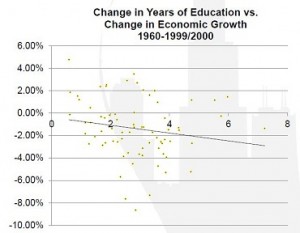Few people dispute that pouring public education is good for economic growth.
Well, you just met one. It has always been my contention that case-and-effect are reversed, sic.: poor countries must grow richer so they afford to educate their people.
For countries that boosted average years of education by increasing spending between 1960′s & 1990′s, there was little if any correlation with improved economic performance.

What might be going on here challenges the notion that the provision of education must be controlled by government. Due to incentive problems, it is not surprising that public-sector provision & control of education tends to fail.
In all events, more important than making substantial investments in human capital is to open the economy so that specialization & division of labor can boost productivity.
Certainly, education matters for individuals. But if it allows individuals to improve their conditions, this weakens the argument for taxpayer funds to be used to support education.
Mais
loading...
Sumário do novo livro de HA-JOON CHANG. 23 Things They Don’t Tell You about Capitalism. Ver entrevista do autor na Globonews no link abaixo http://globotv.globo.com/globonews/milenio/t/programas/v/economista-sul-coreano-avalia-os-desafios-do-atual-sistema-capitalista/2132771/...
Brazilians need to overcome prejudice against technical education
In Brazil, 6.6% of students attend regular high school together with some form of vocational education. In OECD countries – the group of rich nations – the rate is 46%.
The number...
O site “Inside Higher Education: The World View” do
Center for International Higher Education do Boston College, publicou a
nota abaixo, aonde trato de resumir o que vem ocorrendo nas
universidades federais no Brasil:
Federal higher education...
O Wall Street Journal nota "... Portugal is the poorest country in Western Europe. It is also the least educated, and that has emerged as a painful liability in its gathering economic crisis...
Education long was an afterthought here. "The southern countries...
Segundo Gary Becker, nem sempre. Should not an increase in earnings inequality due primarily to higher rates of return on education and other skills be considered a favorable rather than unfavorable development? Higher rates of return on capital are...

